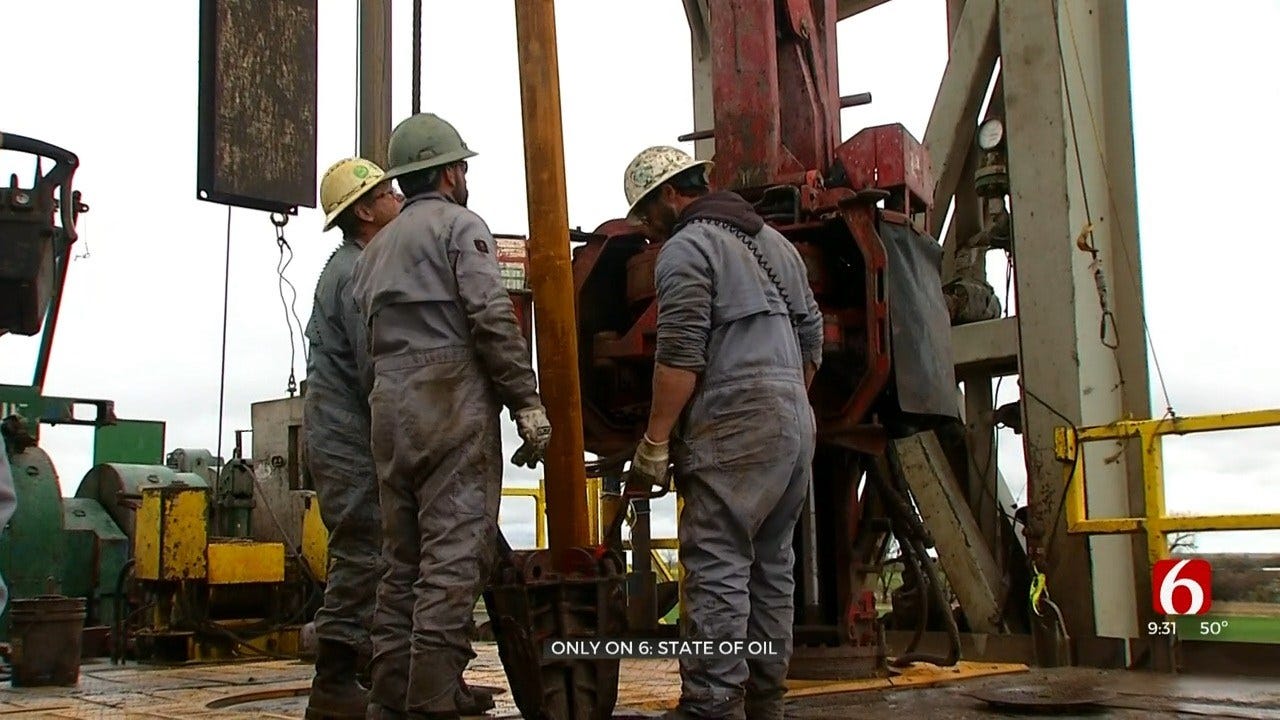6 Investigates: Oklahoma Oil Industry Going Through Rough Patch
The shuttering this week of Halliburton's El Reno facility and the corresponding loss of more than 800 jobs there is the latest sign that the oil and gas industry is hurting in Oklahoma.Thursday, December 12th 2019, 10:49 pm
The shuttering this week of Halliburton's El Reno facility and the corresponding loss of more than 800 jobs is the latest sign that the oil and gas industry is hurting in Oklahoma.
Other indicators have been less dramatic, perhaps, but equally telling: bankruptcies among oil and gas companies are well up over last year, both nationwide and in Oklahoma, and the state's active rig count is down significantly.
"We've seen a pretty drastic rig count drop," confirmed Tanner Stewart, Vice President of Operations for Select Energy Services' Water Solutions Division.
Active rigs in Oklahoma peaked at 148 in November 2018. As of late last week, the number was 51, a decline of nearly two-thirds.
Stewart said Houston-based Select's workload has also declined, as a result. He said they remain the largest water solutions provider in the industry, but have had to trim their workforce, including in Oklahoma.
"We're a pretty tight-knit family, as a whole, here at Select," Tanner stated. "So, to have to see people go without jobs. It's very difficult, very difficult to see."
"Things have slowed down significantly now," said Walt Duncan, President of Duncan Oil Properties, a small Oklahoma City-based exploration and production firm.
A fourth-generation producer, Duncan understands the cyclical nature of the oil and gas business. He and his family have had to maneuver Duncan Oil through every downturn dating back to the 1940's. He said this one is different.
"It's an unusual slowdown," Duncan explained. "This one is really being driven by the capital markets in New York."
Duncan, who also sits on the Oklahoma City branch of the Kansas City Federal Reserve, said Wall Street is no longer bullish on oil and gas. He said, about a year ago, Wall Street investors turned off the tap.
Traditionally, blue chip energy stocks were included in every portfolio and investors willingly extended to those energy companies the capital to fund exploration and acquisition of new leases, even if the investments didn't immediately turn a profit.
"They're really not willing to do that anymore," Duncan said. "They're basically telling the public companies, 'You have all the drilling locations you need, drill them profitably and give us some of our money back, and then we'll see.'"
"Right now, the oil and gas industry are out of favor, when it comes to Wall Street," agreed Steve Agee, Dean of Oklahoma City University's Meinders School of Business, "except in the hottest play in the U.S., which happens to be the Permian Basin, and that's not in Oklahoma."
Wall Street investors turning their back on oil and gas is compounding an unlikely, but the real problem for the industry is it has become too efficient. More than doubling production in the last decade has brought the country closer to energy independence, but experts said it's also created a glut that is helping keep prices too low for companies to make the profits investors want, or to support workforces that were hired when production wasn't so efficient.
"The industry's shrinking, in terms of the labor force," said Agee.
What's also shrinking right now are Oklahoma's gross production tax collections, which fund between six and nine percent of the state's annual budget.
After hitting a high of $118 million in November 2018, monthly GPT revenue has steadily declined, down thirty percent to $82 million in November 2019.
Amid these troubling signs, there was a positive development for the industry this fall. For the first time since government began keeping records in 1949, the U.S. posted its first full month as a net exporter of crude oil and petroleum products. According to data from the Energy Information Administration, the nation exported 89,000 barrels a day more than it imported in September, showing that the nation is moving away from relying on foreign oil.
That's one reason Agee remains optimistic, noting that energy demand continues to grow worldwide. He said there are forecasts suggesting crude oil prices will begin inching back up late next year, and when that happens, he said, Wall Street will come back.
"Wall Street always looks to where their return on equity is the greatest," Agee said, "I mean, they're agnostic about what you do for a living or how you produce whatever you produce, they want return. So, they are shying away from oil and gas right now, but that won't last forever, that will change."
At Select Energy Services, they're also confident that a rebound's coming. Tanner Stewart said if it doesn't come tomorrow, they'll survive.
"Being an Oklahoman, it's part of the nature of us," said Stewart. "We've seen it before. We're a tough group of people."


Alex Cameron
Alex Cameron is Griffin Media’s Washington Bureau Chief, reporting from our nation’s capital on issues that impact Oklahomans. An award-winning journalist, Alex first joined the News 9 team in 1995, and his reporting has taken him around the world, covering stories in Bosnia, Colorado, Washington, D.C., Seattle, New York and Ukraine.
More Like This
December 12th, 2019
January 2nd, 2025
Top Headlines
June 14th, 2025
June 14th, 2025
June 14th, 2025










